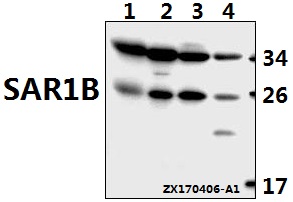Product Name :
SAR1B polyclonal antibody Background :
There are a number of components involved in the secretory pathway of cells. Vesicular traffic within the early secretory pathway is mediated by COPI- and COPII-coated vesicles. The COPII vesicle coat protein promotes the formation of endoplasmic reticulum (ER) derived transport vesicles that carry secretory proteins to the Golgi complex. The SAR1 gene encodes two isoforms, Sar1a and Sar1B, in mammalian cells. These proteins are low-molecular-weight GTPases, which are essential for the formation of transport vesicles from the ER. Mutations in the SAR1 gene result in Anderson’s disease (and/or chylomicron retention disease CMRD), a rare, autosomal recessive lipid malabsorption disorder characterized by chronic diarrhea, failure to thrive and hypocholesterolemia in childhood. Product :
Rabbit IgG, 1mg/ml in PBS with 0.02% sodium azide, 50% glycerol, pH7.2 Storage&Stability :
Store at 4°C short term. Aliquot and store at -20°C long term. Avoid freeze-thaw cycles. Specificity :
SAR1B polyclonal antibody detects endogenous levels of SAR1B protein. Immunogen :
Synthetic peptide, corresponding Human SAR1B. Conjugate :
Unconjugated Modification :
Unmodification
SAR1B polyclonal antibody Background :
There are a number of components involved in the secretory pathway of cells. Vesicular traffic within the early secretory pathway is mediated by COPI- and COPII-coated vesicles. The COPII vesicle coat protein promotes the formation of endoplasmic reticulum (ER) derived transport vesicles that carry secretory proteins to the Golgi complex. The SAR1 gene encodes two isoforms, Sar1a and Sar1B, in mammalian cells. These proteins are low-molecular-weight GTPases, which are essential for the formation of transport vesicles from the ER. Mutations in the SAR1 gene result in Anderson’s disease (and/or chylomicron retention disease CMRD), a rare, autosomal recessive lipid malabsorption disorder characterized by chronic diarrhea, failure to thrive and hypocholesterolemia in childhood. Product :
Rabbit IgG, 1mg/ml in PBS with 0.02% sodium azide, 50% glycerol, pH7.2 Storage&Stability :
Store at 4°C short term. Aliquot and store at -20°C long term. Avoid freeze-thaw cycles. Specificity :
SAR1B polyclonal antibody detects endogenous levels of SAR1B protein. Immunogen :
Synthetic peptide, corresponding Human SAR1B. Conjugate :
Unconjugated Modification :
Unmodification
-
 Western blot (WB) analysis of SAR1B polyclonal antibody at 1:500 dilution Lane1:The Brain tissue lysate of Mouse(40ug) Lane2:The Brain tissue lysate of Rat(40ug) Lane3:HepG2 whole cell lysate(40ug) Lane4:HCT116 whole cell lysate(40ug)
Western blot (WB) analysis of SAR1B polyclonal antibody at 1:500 dilution Lane1:The Brain tissue lysate of Mouse(40ug) Lane2:The Brain tissue lysate of Rat(40ug) Lane3:HepG2 whole cell lysate(40ug) Lane4:HCT116 whole cell lysate(40ug)
Bioworld Biotech only provide peptides for our antibodies and do not provide additional peptide customization services.
Price/Size :
USD 368/1mg/vial
Tips:
For phospho antibody, we provide phospho peptide(0.5mg) and non-phospho peptide(0.5mg).Describe :
Blocking peptides are peptides that bind specifically to the target antibody and block antibody binding. These peptide usually contains the epitope recognized by the antibody. Antibodies bound to the blocking peptide no longer bind to the epitope on the target protein. This mechanism is useful when non-specific binding is an issue, for example, in Western blotting (WB) and Immunohistochemistry (IHC). By comparing the staining from the blocked antibody versus the antibody alone, one can see which staining is specific; Specific binding will be absent from the western blot or IHC performed with the neutralized antibody.Formula:
Synthetic peptide was lyophilized with 100% acetonitrile and is supplied as a powder. Reconstitute with 0.1 ml DI water for a final concentration of 10 mg/ml.The purity is >90%,tested by HPLC and MS.
Storage:
The freeze-dried powder is more stable. For short time at 2-8°C. For long term storage store at -20°C.
Note :
This product is for research use only (RUO only). Not for use in diagnostic or therapeutic procedures.
 SAR1B polyclonal antibody
SAR1B polyclonal antibody  Datasheet
Datasheet COA
COA MSDS
MSDS SHIP
SHIP